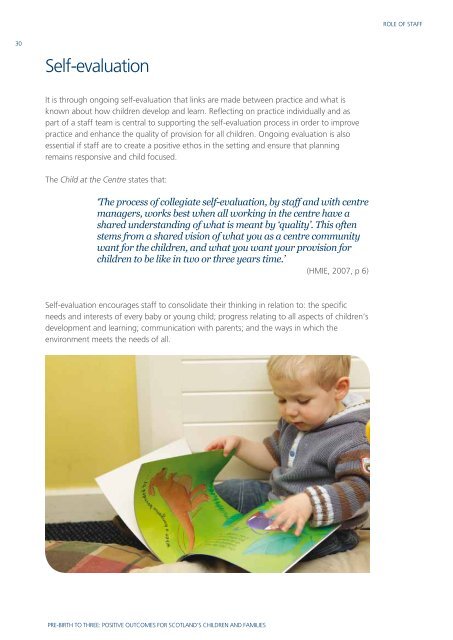Pre-Birth to Three guidance (2.3 - Education Scotland
Pre-Birth to Three guidance (2.3 - Education Scotland
Pre-Birth to Three guidance (2.3 - Education Scotland
Create successful ePaper yourself
Turn your PDF publications into a flip-book with our unique Google optimized e-Paper software.
30<br />
Self-evaluation<br />
It is through ongoing self-evaluation that links are made between practice and what is<br />
known about how children develop and learn. Reflecting on practice individually and as<br />
part of a staff team is central <strong>to</strong> supporting the self-evaluation process in order <strong>to</strong> improve<br />
practice and enhance the quality of provision for all children. Ongoing evaluation is also<br />
essential if staff are <strong>to</strong> create a positive ethos in the setting and ensure that planning<br />
remains responsive and child focused.<br />
The Child at the Centre states that:<br />
‘The process of collegiate self-evaluation, by staff and with centre<br />
managers, works best when all working in the centre have a<br />
shared understanding of what is meant by ‘quality’. This often<br />
stems from a shared vision of what you as a centre community<br />
want for the children, and what you want your provision for<br />
children <strong>to</strong> be like in two or three years time.’<br />
(HMIE, 2007, p 6)<br />
Self-evaluation encourages staff <strong>to</strong> consolidate their thinking in relation <strong>to</strong>: the specific<br />
needs and interests of every baby or young child; progress relating <strong>to</strong> all aspects of children’s<br />
development and learning; communication with parents; and the ways in which the<br />
environment meets the needs of all.<br />
PRE-BIRTH TO THREE: POSITIVE OUTCOMES FOR SCOTLAND’S CHILDREN AND FAMILIES<br />
ROLE OF STAFF

















